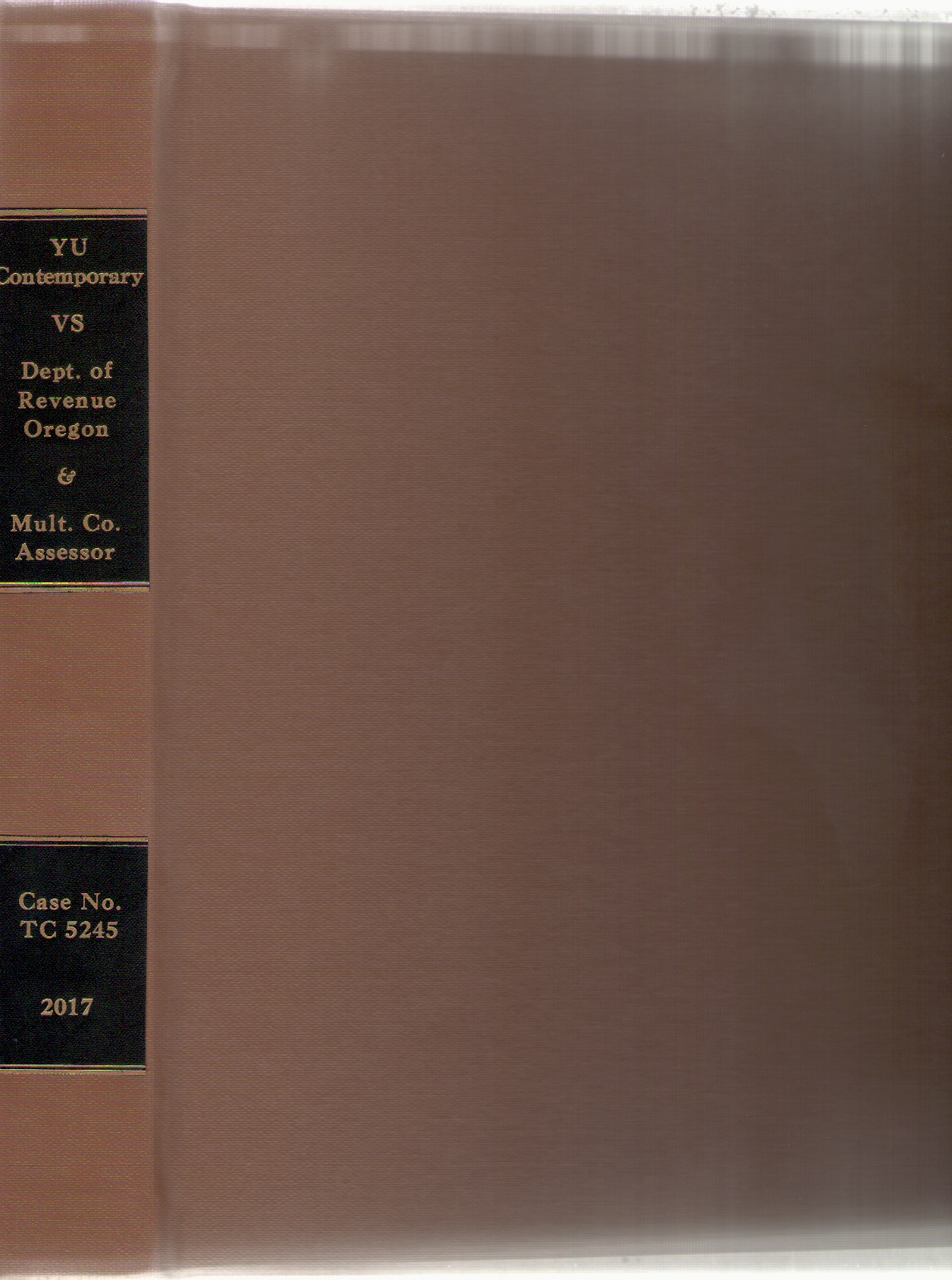JAMISON, Aaron Flint
YU Contemporary VS Dept. of Revenue Oregon & Mult. Co. Assessor
mmhmm 10:15 14:1,6 24:3 26:3 27:25 28:18 28:18 34:17 39:5 47:7 47:13,17 48:13,17 59:13 62:5 67:20,23 80:15 83:7 84:20 86:11,18 89:14 91:20 92:4 93:2 95:5 96:12 97:9 99:18 100:11 107:4 110:22 116:4 117:13 119:16 120:22 121:1,16 126:21 127:4 134:11 137:12 138:23 143:5 145:19 146:22 148:16 155:12 157:20 165:16 168:8 173:9 180:1,18 184:21 195:25 198:22 199:19 204:9 210:7 210:24 214:9 215:19 215:22 218:12,22 222:16 224:1 225:6,8 228:14 229:4 230:2 234:1 235:19 238:25 248:10 255:21 260:4 262:13 263:25
Aaron Flint Jamison’s YU Contemporary vs. Dept. of Revenue Oregon & Mult. Co. Assessor gathers all the official legal documents related to the eponymous 2016 court case. The case, brought by the Portland art center Yale Union, of which Aaron Flint Jamison is co-founder and Board Chair, contested a ruling by Multnomah County[1] that disregarded the institution’s status as an non-profit “art museum” in the setting of property tax rates. In a section of YU Contemporary vs. Dept. of Revenue Oregon & Mult. Co. Assessor devoted to the transcription of the court hearing in which Jamison gave testimony (the “Verbatim Report of Proceedings”), a comprehensive index is provided, including the above entry. “mmhmm” is uttered ninety-four times in the course of the hearing, sixteen times by Jamison.
The index, the ledger, the inventory, and the spreadsheet: these are systems that organize information, record transactions, and codify exchanges in pursuit of administrative efficiency. This exhibition is comprised of a number of such mechanisms, both in familiar and unfamiliar forms. They uniformly take stock, however, of one particular relationship: that of Jamison with Yale Union. Jamison respects that—underneath and perhaps within all its social, material, affective, and intellectual aspects—this relationship is contingent on a particular set of property relations.
The non-profit art institution in the United States conspicuously operates under the pretense of disavowing property. Or, at least, it aspires to remove from the instance of presentation of artwork speculation over material ownership, maintaining it in its “uncontested” state of intellectual property. But of course this notion of detachment from the exertions of rights of possession and use is by and large delusional, particularly in the U.S. The value within a non-profit art institution, both that held by artworks and that which is formed through the circulation of ideas and knowledge, is put to work and possessed in many ways. If rights to physical or intellectual property determine who can use, alter, sell, or capture the payoffs accruing to it, then the non-profit art institution constitutes a plethora of banked and uncontested rights claims – from artists, directors, curators, and board members. The non-profit art institution is a peculiar kind of battleground for conflicting modes of libertarianism. Jamison here captures this conflict as material.
The capturing of materials is a possessive act, a point of articulation of that entity as discursively operative within a secured and governed field. Yale Union is a form of property management system in the capacity of cultural producer. This exhibition constitutes a prosthetic extension of this system, one in which Jamison implicates the global art market through the redirection of funds accrued through the sale of property.[2] These are not discrete pockets of property, but traceries of individual and institutional intellectual, physical, and affective labor, social and cultural capital, presented in full awareness of these complications and complicities. YU Contemporary vs. Dept. of Revenue Oregon & Mult. Co. Assessor serves as a document of Yale Union’s layered sovereignties in its exhaustive and “verbatim” survey of YU’s historical constitution and programming, all in service of establishing the value of its productive relations to “civil society,” as opposed to private gain.
—Richard Birkett
Printed, sewn, and glued in Portland, OR, at Yale Union. Published by Galerie Max Mayer, Düsseldorf, Germany as part of Aaron Flint Jamison’s exhibition on view May 6–July 1, 2017
Published by Galerie Max Mayer
Artists' Books / Politics
